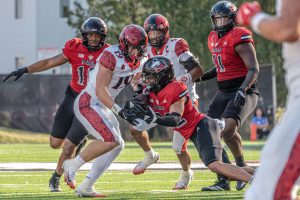Muslim students react to post- Sept. 11 discrimination
September 11, 2011
A decade after Sept. 11, junior education major Bettunia Diab still clearly remembers what her fifth grade classmate called her that morning: “terrorist.”
“Stuff like that happens everyday, but you can’t dwell on it,” Diab said. “People are just so ignorant when they say those things.”
Muslims on campus may agree or disagree that the treatment of the Muslim community has improved since Sept. 11, but many have experienced discrimination or had others make wrong assumptions about their religion.
Muslim Students Association president Syed Rehman said location, politicians’ stances and extremist religious groups’ beliefs can influence whether a Muslim experiences discrimination or not.
“Overall, Americans understand that we cannot judge a quarter of the world’s population by the actions of a few individuals,” Rehman said.
MSA advisor Atique Ahmed said it is important to remember that the Sept. 11 terrorist attacks were completely against the Islamic religion, culture and teachings.
“It was an act of violence committed by somebody using a Muslim name,” Ahmed said. “No real Muslim would ever attempt to do something like that.”
Former MSA president Asna Qureshi said many people dislike the Islamic religion because they don’t think of it as a religion, but consider it a political movement.
“A lot of people have that idea,” Qureshi said. “I just don’t know where they are getting it from.”
Misinformation about Islam can contribute to discrimination and create controversy, Rehman said. One example, Rehman said, is the Park51 community center, located a few blocks away from Ground Zero, that was incorrectly called a mosque.
Ahmed said the center has an area for Muslims to pray, but is also open to everyone else in the community, similar to the concept of a YMCA.
“There were a lot of people that died that day at Ground Zero; some were American Muslims,” Rehman said. “We have to remember all of them.”
Rehman, Diab and senior biology major Hana Muhsin have all faced discrimination at some point in their lives because of their religious beliefs.
“I’ve been singled out by teachers and even some peers, but that has never stopped me as a Muslim from continuing to share my faith with people,” Rehman said.
Diab said she hasn’t flown since Sept. 11 because her brothers and sisters are always stopped for extra screening. Diab said she never wants to go on an airplane again.
“I’m too terrified,” said Diab. “I can’t deal with discrimination.”
Muhsin said by wearing her hijab, a head covering some Muslim women wear, it is more apparent to people that she is Muslim.
“I do get dirty looks a lot when I’m going into buildings,” Muhsin said.
Rehman acknowledges that many Muslims have faced some form of discrimination, but he still remains positive.
“Since September 11, more people in America have researched Islam more than ever before,” Rehman said. “September 11 forced Americans to get outside of their bubbles.”






